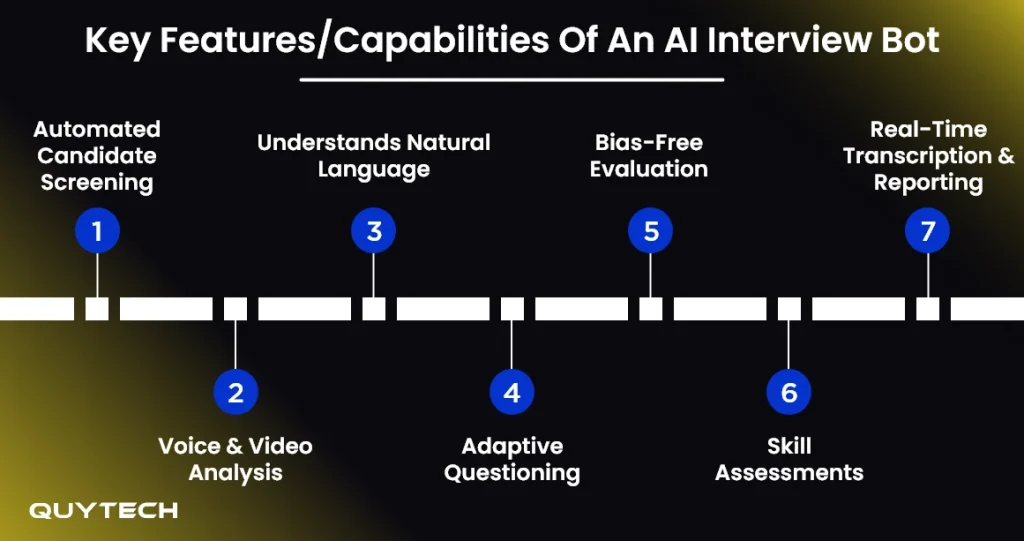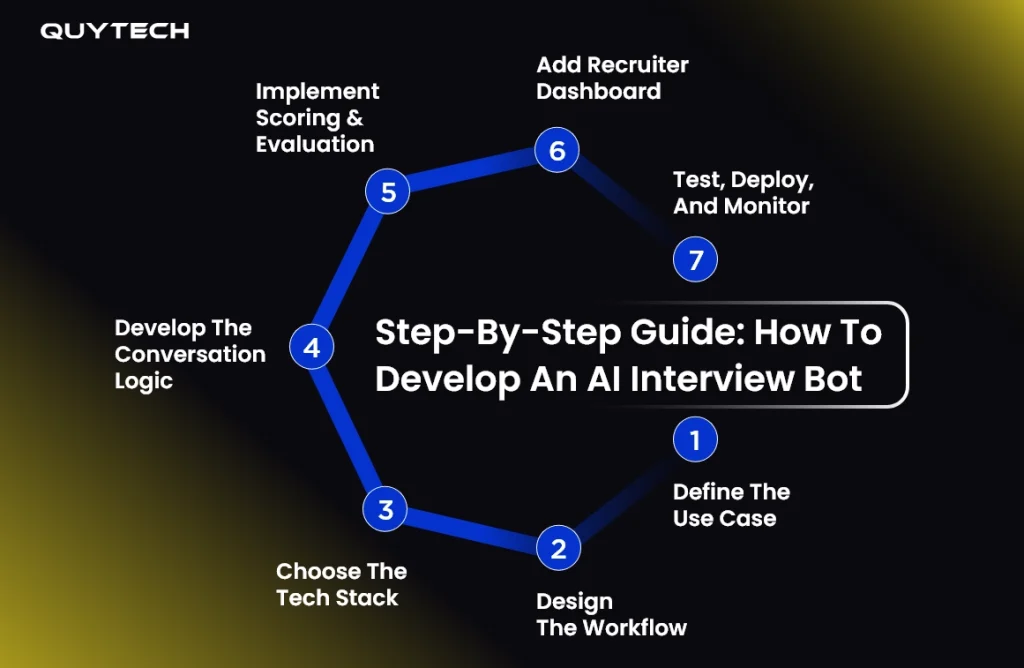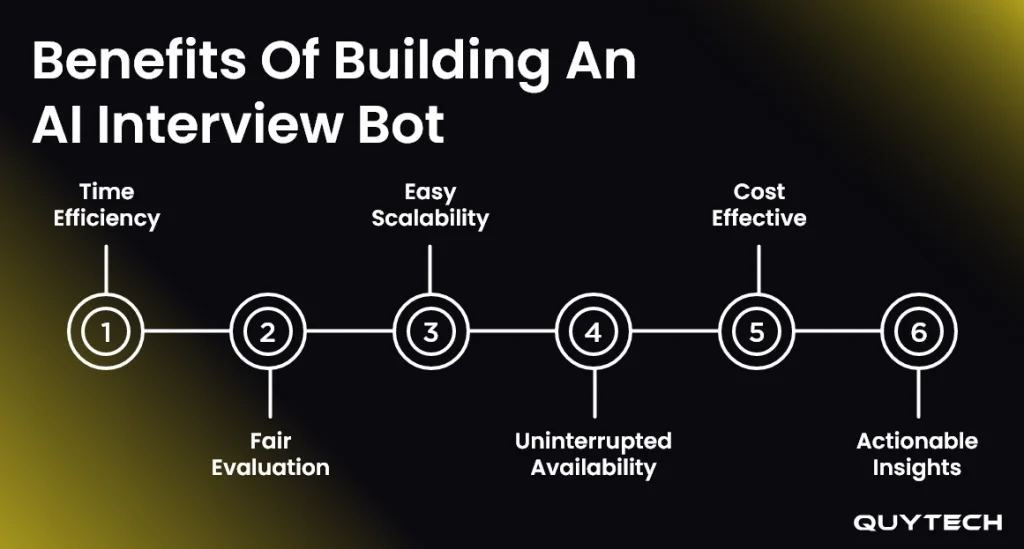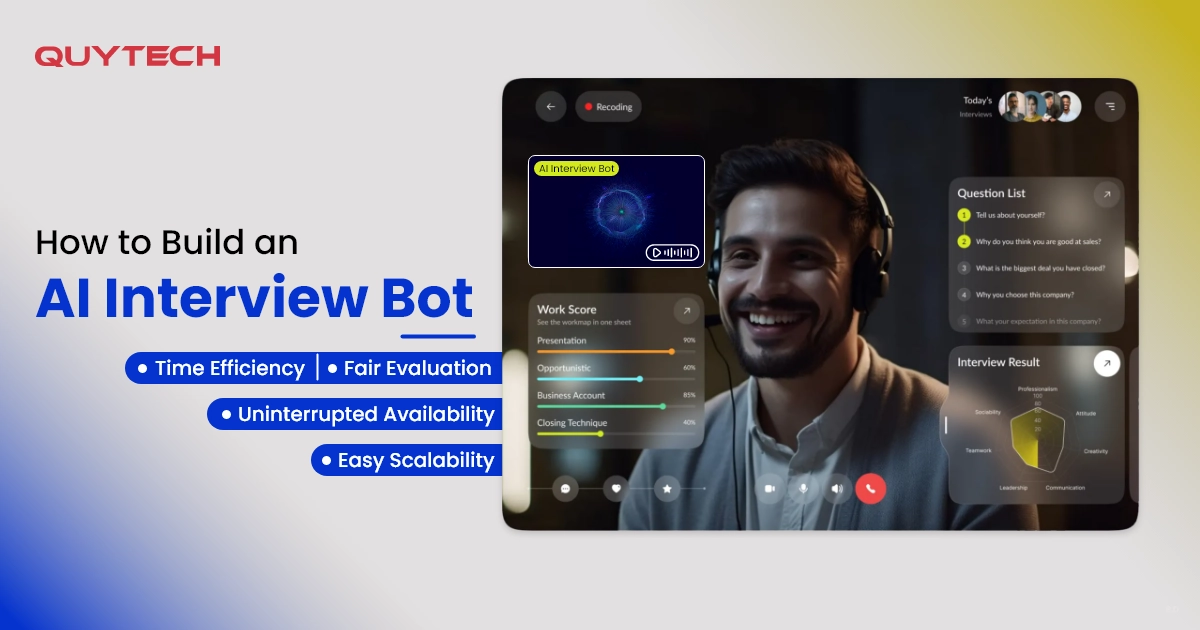We have entered a competitive era where every business wants to stand out. Some invest in technology to gain the edge, while some hire talent to stand out. But what if we tell you that you can do both? Yes, you read that right.
By building an AI interview bot, businesses can leverage technology to hire top talent. AI interview bots utilize NLP, machine learning, and speech recognition technologies. With these, recruiters can test candidates and hire the right people for the right positions.
But the question is, how do you build an AI interview bot? This blog will guide you through everything from key features to the development process of an AI interview bot.
Key Takeaways:
- The AI chatbot market will reach over $29 Bn by 2029.
- Interview bots analyze voice and video through NLP for screening.
- They are bias-free and hire based on skills.
- AI Interview bots are scalable, fast, and active 24/7.
- These are powered by NLP, ML, cloud, and scoring models.
- AI bots save time, cost, and offer data-based insights.
Market Stats of AI Bots
- According to a report by The Business Research, the global AI chatbot market is expected to grow from $ 8.6 billion in 2024 to $ 11.06 billion by 2025.
- The market is expected to grow to $29.17 billion by 2029 with a CAGR of 28.4%.
- As per research by Tidio, more than 987 million people use AI chatbots for one or another purpose.
- The research also highlights that almost 1.5 million people have interacted with a chatbot at least once.
Key Capabilities of an AI Interview Bot
Let’s begin with understanding the core capabilities of an AI interview bot:

Automated Candidate Screening
Automated candidate screening means that the AI interview bot should be capable of conducting the initial screening stage by itself.
This saves the time and effort that recruiters spend in the initial hiring process. The interview bot conducts the interview and selects or rejects candidates based on that.
Voice and Video Analysis
AI interview bots do not just stick to resumes. They are capable of analyzing voice and video-based interviews as well. Interview bots can analyze the sentiments and expressions of the candidates.
They examine their way of responding, confidence, clarity, etc, to determine whether to select or reject candidates.
Understands Natural Language
AI interview bots use natural language understanding. It helps them in understanding open-ended responses given by candidates during the interview. Natural language understanding summarizes responses into key highlights.
With this, the bots can evaluate the natural response ability of the candidates and understand how they react in certain situations.
Adaptive Questioning
The adaptive questioning feature highlights the ability of AI interview bots to adapt their questions based on the responses. AI interview bots are also capable of customizing their questions based on the designation and position that the candidates have applied for.
This feature improves the relevancy of the interview bots. It ensures that the questions that are being asked match the level of expertise, experience, and role of the candidates.
Bias-Free Evaluation
AI interview bots evaluate performance based on the response and nothing else. This means that they do not discriminate among candidates based on their background, race, or any personal bias.
The only factor of differentiation they follow is response assessment. They judge and evaluate based on the candidates’ responses.
Skill Assessments
The AI interview bots go beyond basic domain knowledge. They test the knowledge and skills of the candidates. Interview bots tailor the questions based on roles.
For technical roles, they would delve into coding-based questions. And, for non-technical candidates, they can create case study-type questions.
Real-Time Transcription and Reporting
Real-time transcription means that the AI interview bots convert the responses into text summaries. The reporting features provide details about the candidates in real-time.
Interview bots are integrated with the HR tools and provide proper interview information on the dashboards.
Read More: How to Build an Agentic SaaS Platform OR How to Integrate AI Agents into a SaaS Platform
How AI Interview Bots Are Transforming Hiring
AI interview bots are the future of hiring as they autonomously automate the recruitment procedures. These bots are capable of handling thousands of applications. They can conduct screening and Q&A rounds, ensuring every question is relevant to the role.
The difference that interview bots bring to the traditional interview systems is way more than just automation. They carry out tasks way faster than human recruiters. The bias factor that often impacts interviews is something not present in interview bots. These bots are available 24/7 without compromising their efficiency.
An AI interview bot makes use of various technologies to make this all possible. It utilizes NLP to interpret and respond, speech-to-text and text-to-speech models for better analysis and conversation flow. Along with these, it uses computer vision, machine learning, and sentiment analysis for a smoother interview flow.
Step-By-Step Guide: How to Develop an AI Interview Bot
Now that we have an idea of what AI interview bots are and how they work, let’s hop on to the next stage. The following steps highlight the process of an AI interview bot development:

Step 1: Define the Use Case
Identify the areas where you want your chatbot to operate. In case of an interview bot, define its task. It can include screening, interview scheduling, assessment rounds, automated application reviewing, etc.
Step 2: Design the Workflow
Once you have decided on the use case, start designing the workflow of your AI interview bot. Create role, domain, and experience-based question banks, define scoring logic, and use sentiment and expression tracking to improve grading accuracy.
Step 3: Choose the Tech Stack
Choose the technology stack that you would require to build an AI interview bot. Here’s a table that can help you:
| Component | Technology Stack |
| Frontend | React, Flutter, or Web Chat |
| Conversation Engine | Dialogflow, Botpress, LangChain |
| Backend | Python (FastAPI/Flask), Node.js |
| NLP/AI Models | OpenAI GPT models, Cohere, Hugging Face |
| Speech-To-Text Models | Whisper API, Google Speech-to-Text |
| Evaluation & Scoring | OpenAI Embeddings, Sentence-BERT |
| Database | PostgreSQL, MongoDB |
| Hosting | AWS, Azure, Google Cloud |
Step 4: Develop the Conversation Logic
This is the stage where you add contextual awareness by implementing a conversation engine. Along with this, integrate sentiment detection models. Also, integrate fallbacks so that your AI interview bot’s interactions are smooth.
Step 5: Implement Scoring & Evaluation
The AI interview bot does not just take assessments; it evaluates them as well. To make it capable of properly grading the assessments, implement scoring and evaluation. This will ensure that the bot compares the answers to the benchmark and gives scores based on that.
Step 6: Add Recruiter Dashboard
Your bot will do its job, but how do you judge its performance? Create a recruiter dashboard where the personnel can access all the key highlights, summaries, and results of interviews conducted.
Step 7: Test, Deploy, and Monitor
Once the above is implemented, test your AI interview bot thoroughly. Fix any deviations that you find and deploy your bot. The development process never ends at deployment. Monitor your interview bot and provide post-deployment maintenance.
Similar Read: How to Develop an AI Virtual Health Assistant- Step-by-Step Guide
Benefits of Building an AI Interview Bot
An AI interview bot does way more than just managing HR workload. Let’s explore some of the benefits of building an AI interview bot:

Time Efficiency
The AI interview bot can handle thousands of applications, that so more efficiently. It reduces the time that a human recruiter takes to review and screen applications. This makes it more time-efficient and allows recruiters to focus on strategic tasks.
Fair Evaluation
An AI interview bot does not have any prejudice or bias against any candidate. It does not judge people based on their background, race, or any such criteria. The only thing it judges is the skills of the applicants.
Easy Scalability
Scalability is never an issue when it comes to AI interview bots. They can scale easily with the organization. Unlike manually handled recruitment processes, you do not need to hire people to manage the chatbots.
Uninterrupted Availability
Unlike human recruiters, interview chatbots do not work fixed shifts. They don’t get tired or need breaks. Neither does their efficiency get affected by the number of applications they deal with in a day. They are available 24/7 and give the same level of efficiency throughout the day.
Cost Effective
AI interview bots are extremely cost-effective. It does not require a larger workforce to handle large numbers of applications. This means that businesses spend less when they utilize an AI interview chatbot for hiring procedures.
Actionable Insights
The interview bots do not just review and screen applicants. They do much more than that. Interview bots analyze the applicants throughout the interview process. Based on the analysis, they provide insights to the HR personnel to make further decisions.
You Might Also Like: How to Develop an Advanced LLM-powered Chatbot?
Real-World Examples of AI Interview Bots
Grasping a concept without examples can be a challenging feat. But not anymore! Here are some real-world examples of AI interview bots:
Unilever
- Unilever blends AI-based chatbots and interview platforms for recruiting graduates around the world.
- This makes screening and assessment stages more efficient and unbiased.
McDonald’s
- McDonald’s makes use of AI-powered chatbots for hour-based role hiring.
- It utilizes the bot for interview scheduling and screening processes.
L’Oréal
- L’Oréal utilizes AI interview bots to handle over a million job applications every year.
- The interview bot manages the applications of the candidates and works on enhancing engagement.
Nestlé
- Nestlé makes use of AI interview bots to automate the screening and interview scheduling processes.
- The bot also contributes to better HR workload management.
How Quytech Helps in Building an AI Interview Bot
Quytech plays its role by bringing in the best resources that help bring your idea to life. Our 14+ years of experience in the domain reflect our dedication towards developing AI solutions. We closely interact and communicate to ensure that we build an AI interview bot that you envision
Our successful AI-based interactive chatbot solutions highlight the effort that our team of dedicated developers put in. We build AI interview bot solutions tailored to your industry needs. We design solutions with scalability in mind, ensuring they grow seamlessly with your business
Conclusion
The introduction of AI interview bots has revolutionized the traditional hiring process. It has cut the time that recruiters spend on reviewing resumes, manually screening candidates, and scheduling interviews.
With benefits that provide more than time efficiency, AI interview bots have accelerated hiring in both speed and effectiveness. This not only provides a tech-savvy edge to businesses but also ensures that the best talent is acquired. In conclusion, implementing AI interview bots in your hiring process is a step in the right direction.
FAQs
To ensure that your AI interview bots comply with data security requirements, implement the regulations in the development stage only.
Absolutely, you can customize your AI interview bot for your company. You can implement your specific role-based questions, scoring strategies, etc.
Yes, AI interview bots are suitable for small businesses. They help with initial recruitment processes and manage the HR workload better.
Yes, AI interview bots utilize computer vision that scans facial expressions during interviews. They analyze and interpret the intent and confidence level.
Not necessarily. If you do not have a tech team, you can still build an AI interview bot by collaborating with an AI chatbot development company or hiring dedicated developers.


